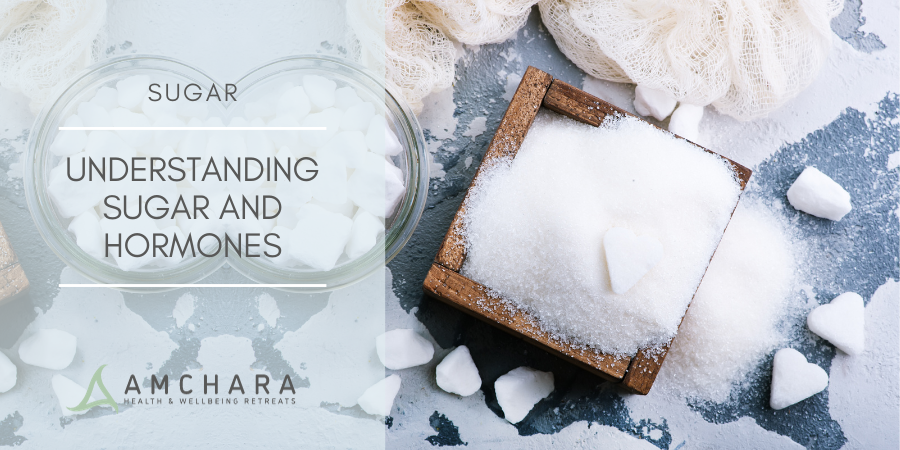You’ve reduced your food intake and upped your exercise. Yet you still can’t seem to lose weight.
Often, weight loss seems to have very little to do with eating and moving.
Let’s talk about one factor which is often overlooked – how hormonal imbalance affects your weight.
Can hormonal imbalance lead to weight gain?
Our bodies have complicated hormonal mechanisms to regulate appetite and weight.
The body likes to keep things constant over the long term – and that includes our weight.
If we try to change things, like eating fewer calories or exercising more to expend energy, compensation mechanisms kick in to make us burn energy more slowly or increase our appetite.
This is achieved by a delicate balance of hormones.
These can easily become out of balance, or over time, our body may become resistant to the messages of certain hormones.
So it could be that a hormone imbalance is contributing to your weight loss problems.
Let’s have a look at six hormones which can impact on your weight loss programme.
Leptin
Leptin is a hormone produced by our fat cells. It tells our brain we are full – in other words, we have enough fat already, thank you!
Normally, the more fat cells you have, the more leptin is produced, so we should feel less hungry.
So, how can we maximise our production of the ‘weight loss hormone’ leptin?
Insufficient sleep can rob us of leptin.
Research has found sleeping less than eight hours per night led to decreased leptin levels and increased body mass index.
If we’re stressed, leptin levels decrease further. Often this causes cravings for fatty or carbohydrate-rich foods.
One study followed 68,000 middle-aged women for sixteen years. People who slept for 5 hours per night or less were 15% more likely to become obese.
In some cases, this system goes awry and the cells’ receptors don’t hear the message from leptin. In other words, we can’t tell if we’re full or not.
This is termed leptin resistance. If that’s the case, your fat can be making a lot of leptin, but your appetite won’t reduce.
Your brain can’t detect the leptin so it thinks the levels are too low, so it makes you even hungrier, and weight loss difficult.
Fructose is a type of sugar found in fruit, fruit juices and high fructose corn syrup.
The research found fructose prevents leptin from rising after a meal, which obviously means increased food intake.
Fructose consumption has also been found to lead to leptin resistance.
READ: Sleep: The impact on hormones and your health
Ghrelin has the opposite effect to leptin.
It is produced from the stomach, and it tells us we are hungry.
Not only this, it increases the storage of visceral body fat. Visceral fat is belly fat and is a risk factor for cardiovascular disease and Type 2 diabetes. Ghrelin levels decrease after we eat, normally for around three hours.
One study found that ghrelin release is higher in women just before ovulation, so if you’re ever-ravenous at this time of the month, ghrelin could be the reason.
In order to lose weight, it’s best if ghrelin levels remain low.
Some researchers believe leptin levels may be connected with ghrelin levels. Interestingly, fructose can increase ghrelin, as can lack of sleep.
High stress also increases ghrelin levels. It appears ghrelin may help guard against symptoms of stress-induced anxiety and depression.
Insulin
This hormone regulates the level of sugar in our blood.
It’s released when blood sugar levels rise after eating. Insulin activates special receptors which cause sugar to enter our cells where it’s used as energy.
If we’re constantly eating sugary foods, our blood sugar will climb high then plummet too low, a situation known as hypoglycaemia.
After a while, insulin receptors become deaf to the message, meaning sugar is not shunted into the cells.
Because the blood sugar stays high, the body keeps on pumping out insulin which therefore remains elevated.
This is termed ‘insulin resistance’, and if you suffer from this, it’s incredibly hard to lose weight.
In excess, insulin leads to weight gain.
One study gave insulin to diabetes patients. They gained an average 8.7kg over six months despite eating 300 calories less per day than prior to the study!
It appears insulin causes our body to lower its metabolic rate and burn fewer calories and may make the body resistant to burning off stored fat for energy.
READ: High Blood Sugar Levels. So problematic but so simple to control
Thyroxine
Thyroxine is the main hormone secreted by our thyroid gland.
It controls many bodily functions including our metabolic rate, in other words, the speed at which we produce energy and burn fat. If thyroxine production drops, the metabolism becomes sluggish and stored fat is burned more slowly. Problems can also occur if we can’t convert thyroxine to its active form.
Low thyroid function, known as hypothyroid, affects ten times as many women as men and is most common between the ages of 40 and 50.
Many thyroid disorders go undiagnosed and lead to fatigue and problems achieving weight loss.
Many factors can interfere with the functioning of our thyroid.
Stress reduces the number of thyroid hormones produced and blocks the conversion of thyroxine to its active form.
Mercury, leached into the blood from dental amalgams and found in tinned fish such as tuna, can lead to similar problems.
Fluoride, found in toothpaste and some water, has a similar chemical structure to iodine, meaning it can replace the iodine molecule in thyroxine, rendering it ineffective.
Goitrogens are chemicals found in certain foods which can interfere with thyroid function. Culprits include soya, millet and brassica vegetables like broccoli, brussels sprouts, cabbage, cauliflower and kale.
READ: Your thyroid – what it does and how it works
Oestrogen
Female hormone imbalance can lead to weight gain.
Oestrogen levels which are too high relative to progesterone – termed ‘oestrogen dominance’ – can lead women to gain weight around the middle as well as retain fluid.
Studies have found that high levels of oestrogen can also lead to insulin resistance and consequent problems with weight loss.
High oestrogen can also suppress the thyroid and partly inactivate thyroxine.
Female hormones plummet after the menopause, but even then a woman can still be oestrogen dominant if her oestrogen levels are higher than progesterone.
Hormone imbalance is a major contributor to weight gain in women ages in their 40’s and 50’s but oestrogen dominance is very common in women of all ages.
High oestrogen levels often accompany menstrual problems like heavy periods, irregular periods, fibroids and painful periods.
Cortisol
Cortisol is released in response to stress.
One of its effects is to mobilise sugar and increase the storage of fat, particularly in our visceral fat cells.
Cortisol slows down our metabolism – a normal response to short-term stress, but not ideal if stress carries on long term.
Stress can also lead to elevated oestrogen levels.
When we are under stress, we also release adrenaline, one of whose roles is to mobilise fat to be burned as fuel.
Research suggests when adrenaline is constantly being released, fat cells can become resistant to its effects.
Energy is not therefore released from fat cells, but since cortisol will also be high, the cells store fat more readily – a recipe for weight gain.
How does being overweight affect your hormones?
Overweight and obese people do appear to have different hormone levels which encourage the further accumulation of body fat.
Obese people tend to have a higher than average level of leptin, but they don’t feel full because they are also suffering from leptin resistance.
The same often occurs with insulin, in that obese people are more likely to be insulin resistant.
How to Balance your Hormones and Lose Weight
We don’t need to be at the mercy of our hormones.
Because they are influenced by diet and lifestyle factors, we do have a degree of control over them.
Here are some strategies to reverse weight gain caused by hormonal imbalance
Better sleep will positively influence leptin, ghrelin and cortisol levels and therefore help with weight loss.
In one study, people sleeping on average 6½ hours per night had elevated cortisol, increased appetite, and experienced weight gain.
Another study found appetite, particularly for sweet and salty foods, increased by over 20% when people lacked sleep.
Ban gadgets or TV just before bed. Make sure your bedroom is dark. Try yoga or meditation to help relax before bedtime or have a warm bath with Epsom salts.
Epsom salts contain magnesium which helps nerves and muscles to relax, and what’s more, it can be absorbed into the body through the skin.
Caffeine can not only interfere with sleep and plays havoc with your blood sugar level, it also raises cortisol levels.
In one study caffeine intake equivalent to three cups of coffee while under mild stress was found to boost cortisol by about a quarter, and the effect lasted for three hours. Remember that tea, cola drinks and energy drinks also contain caffeine.
A blood sugar balancing diet can reverse insulin resistance and decrease cortisol levels, so it’s a vital component in any weight loss programme.
As a bonus, once your blood sugar levels are stable, you may find your sleep will improve, particularly if you tend to wake up at the same time each night because blood sugar crashes release adrenaline, which wakes you up.
Choose unprocessed, complex carbohydrates instead of simple sugars which release their energy slowly into the bloodstream to avoid insulin peaks and troughs.
An added benefit of including high-fibre foods in your diet is they make you feel fuller sooner.
Some fats don’t make you fat
Omega 3 Essential Fatty acids appear to help to lower insulin resistance and therefore help with weight loss.
Scientists have suggested they could also influence leptin resistance. These fats are found in oily fish, flax, pumpkin and chia seeds, and nuts like walnuts.
Rather than trying to avoid all stress, which is impossible, aim to alter your body’s response to perceived stress.
Destressing can lower cortisol levels, assist with blood sugar control and will help to avoid oestrogen climbing too high.
Yoga, meditation, deep breathing exercises, as well as exercise, can all help you to manage stress and decrease your cortisol levels.
Help your thyroid gland to rev up your metabolism by avoiding fluoride.
Switch to a natural toothpaste which is fluoride-free.
Consider investing in a water filter if fluoride is added to water supplies in your area.
Don’t eat timed tuna more than once weekly in order to avoid mercury exposure.
It’s best not to eat excessive quantities of raw foods containing goitrogens if your thyroid is struggling.
Cooking appears to inactivate these substances so you don’t need to avoid these foods completely.
They contain a whole host of other beneficial substances including antioxidants which help our liver detoxify excess hormones.
Don’t forget fibre
Plenty of dietary fibre is an essential part of any weight loss programme.
It can increase the number of used hormones excreted by the body and can be useful in managing oestrogen levels. It can also make us feel fuller sooner.
Will losing weight help my hormonal imbalance?
In the same way that balancing your hormones can help you to lose weight, weight loss can help bring your hormones back into balance.
Does losing weight too fast trigger a chemical imbalance?
Slow but sure – a maximum of 2lbs per week – is the goal when it comes to weight loss.
If weight is lost too rapidly, it can be counterproductive.
When food is restricted in a severe diet, electrolyte intake is reduced and can become unbalanced, causing dehydration.
Unbalanced electrolytes may also affect our blood pressure.
Because rapid weight loss causes the liver to release extra cholesterol into the bile, there is also a risk of developing gallstones.
Losing weight too fast can also lead to loss of muscle mass and your metabolism slowing down.
All this means it’s more likely you will regain the weight once it’s lost.
By following the guidelines above, you can go a long way towards balancing your hormones and achieving a healthy and sustained weight loss.
Because we all have different DNA, our individual hormone balance is unique to each of us.
A consultation with an Amchara practitioner can recommend a weight loss programme personalised to you and your individual hormone picture.
Author: Cathy Robinson BScDipNutMed
Read Next:
More Hormone Balancing Stories
-
How to Fix Your Hormones and Lose Weight – by Dr Hyman
-
5 Ways to Lose Weight through Natural Hormone Balancing – by Dr Sara Gottfied
-
Hormones and Weight Gain – by Christina Carlyle










